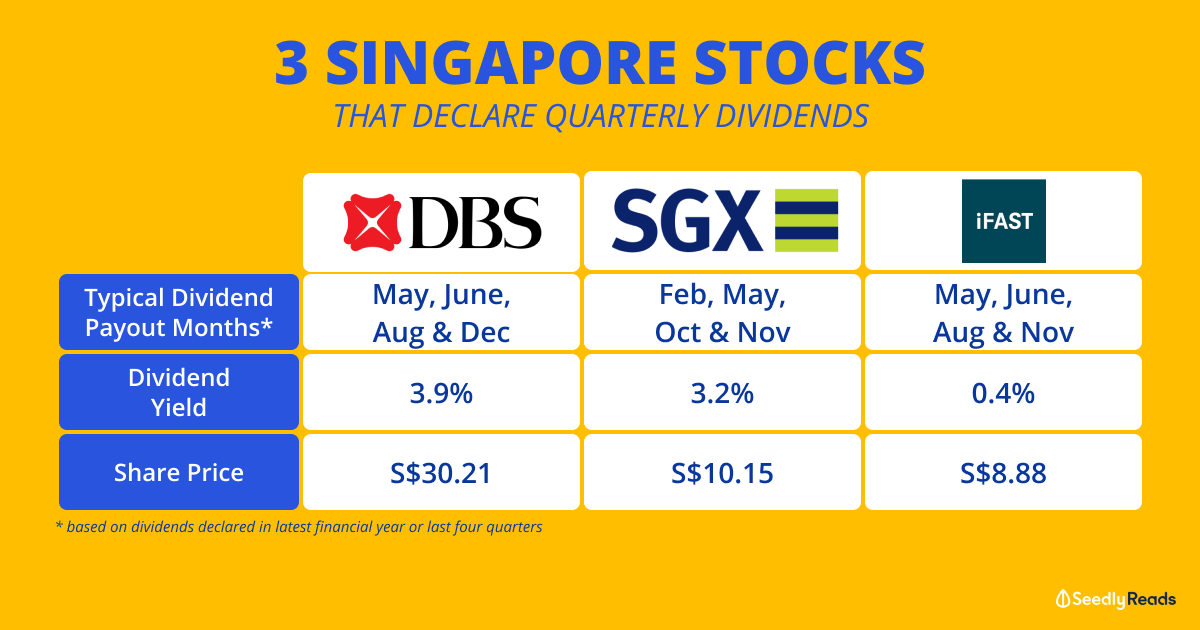Advertisement
Anonymous
Hi, I’m a beginner investor. I still do not understand the concept of ETF and how much money should I put in every month. Is it a must to put money every month?
Hi, I’m a beginner investor. I still do not understand the concept of ETF’s dividend and how much money should I put in every month. Isit a must to put money every month? If I were to put 100USD per month in an ETF (e.g CQQQ), do I need to reach certain amount and stop investing?
2
Discussion (2)
Learn how to style your text
Reply
Save
As a private 1-on-1 tutor, your student pays you the tuition fees directly maybe after each lesson.
As a tutor in a tuition centre, the students pay the tuition centre after every lesson, and the tuition centre pays you your salary at the end of every month.
Dividends from a stock investment is like being a private tutor and you can have many different students individually but u have to manage them.
Etf dividend is like a tuition centre (etf provider) who distribute you the fees (dividends) received from the students (underlying stock holdings) at a particular frequency. It could be monthly, quarterly, annually, whichever.
The second part of your qns is more on portfolio management, and it's really dependent on you. Is it a must monthly, no, because it depends on the quantum you're comfortable with. If you are putting such a small amount where investing all that will still cause u to incur the minimum brokerage expense, then it's better to accumulate and inject a bigger amount quarterly for example.
Diversify your portfolio. Don't look at it in $ terms. Look at it in % weight of your portfolio. Just because it's an etf doesn't mean there no concentration risk. An etf like cqqq is still 100% exposed to China geographical risk.
Reply
Save
Write your thoughts
Related Articles
Related Posts
Related Products

Saxo Markets
4.5
959 Reviews
US$1
MINIMUM FEE
0.03% to 0.08%
TRADING FEES
Custodian
STOCK HOLDING TYPE

Moomoo Singapore
4.7
484 Reviews

Syfe Trade
4.9
131 Reviews
Related Posts
Advertisement










Hello, there are several concepts introduced in your question.
First you need to understand the concept of a stock index. Stock indices basically take a sample of stocks that are deemed to be representative of an industry, country, sector or other area. So, kind of like an aggregate of a bunch of companies.
Now, let's look at an ETF. An ETF is a type of security. What this means is that it is a tradable financial asset. You can buy and sell this on the market.
An ETF typically tracks a stock index. So it holds a basket of the underlying stocks of an index. In the context of Singapore, the SPDR Straits Times Index ETF tracks the Straits Times Index (STI). So the ETF will contain a basket of stocks that is in the STI.
As for the other question about putting in money each month, it really depends on you. Dollar Cost Averaging (DCA) works by investing a fixed amount every month, so you don't need to worry about timing the market. If the prices are low this month, you'll invest in more shares; if the prices are high, you'll have less. It's so that you don't need to worry that much about the short-term volatility of the market.
Here are some resources I used to learn more about ETFs:
https://www.youtube.com/watch?v=5A4lp_oZ5zg
https://www.investopedia.com/terms/e/etf.asp
For DCA vs Lump Sum:
https://dollarsandsense.sg/active-investing-vs-...
Hope this information helps!